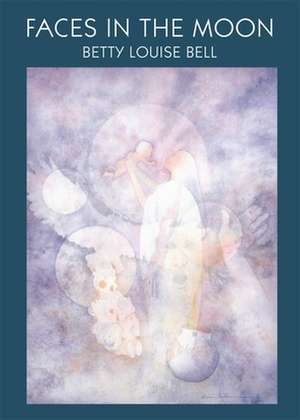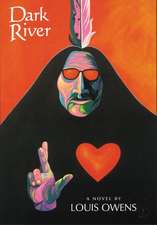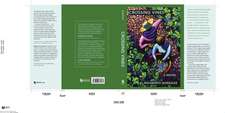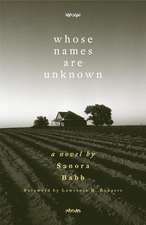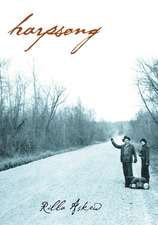Faces in the Moon: American Indian Literature & Critical Studies (Paperback), cartea 9
Autor Betty Louise Bellen Limba Engleză Paperback – 31 aug 1995
Faces in the Moon is the story of three generations of Cherokee women, as viewed by the youngest, Lucie, a woman who has been able to use education and her imagination to escape the confines of her rootless, impoverished upbringing. When her mother's illness summons her back to Oklahoma, Lucie finds herself confronted with the legacy of a childhood she has worked hard to separate from her adult self.
Her mother, Gracie, and her maternal aunt, Auney, are members of the Cherokees' "lost generation," women who rejected the traditional rural ways in search of a more glamorous life as autonomous working women.
Din seria American Indian Literature & Critical Studies (Paperback)
-
 Preț: 134.86 lei
Preț: 134.86 lei -
 Preț: 172.74 lei
Preț: 172.74 lei -
 Preț: 122.96 lei
Preț: 122.96 lei -
 Preț: 132.81 lei
Preț: 132.81 lei -
 Preț: 140.47 lei
Preț: 140.47 lei -
 Preț: 177.15 lei
Preț: 177.15 lei -
 Preț: 92.77 lei
Preț: 92.77 lei -
 Preț: 116.49 lei
Preț: 116.49 lei -
 Preț: 196.61 lei
Preț: 196.61 lei -
 Preț: 153.73 lei
Preț: 153.73 lei -
 Preț: 177.91 lei
Preț: 177.91 lei -
 Preț: 178.13 lei
Preț: 178.13 lei -
 Preț: 176.39 lei
Preț: 176.39 lei -
 Preț: 120.88 lei
Preț: 120.88 lei -
 Preț: 176.00 lei
Preț: 176.00 lei -
 Preț: 176.39 lei
Preț: 176.39 lei -
 Preț: 184.16 lei
Preț: 184.16 lei -
 Preț: 103.23 lei
Preț: 103.23 lei -
 Preț: 157.40 lei
Preț: 157.40 lei -
 Preț: 201.80 lei
Preț: 201.80 lei -
 Preț: 196.40 lei
Preț: 196.40 lei -
 Preț: 243.15 lei
Preț: 243.15 lei -
 Preț: 157.22 lei
Preț: 157.22 lei
Preț: 170.63 lei
Nou
Puncte Express: 256
Preț estimativ în valută:
32.65€ • 34.09$ • 26.96£
32.65€ • 34.09$ • 26.96£
Carte tipărită la comandă
Livrare economică 15-29 aprilie
Preluare comenzi: 021 569.72.76
Specificații
ISBN-13: 9780806127743
ISBN-10: 0806127740
Pagini: 200
Dimensiuni: 121 x 191 x 15 mm
Greutate: 0.2 kg
Ediția:New.
Editura: University of Oklahoma Press
Seria American Indian Literature & Critical Studies (Paperback)
ISBN-10: 0806127740
Pagini: 200
Dimensiuni: 121 x 191 x 15 mm
Greutate: 0.2 kg
Ediția:New.
Editura: University of Oklahoma Press
Seria American Indian Literature & Critical Studies (Paperback)
Textul de pe ultima copertă
"As my grandmother was dying, she told my mother, then nine years old, that she would always be watching her from the moon. And throughout her childhood, my mother sat on her back porch and waited for her mother's face to appear in the moon. Sometimes she saw it clear and defined, and she went to bed happy". Faces in the Moon is the story of three generations of Cherokee women, as viewed by the youngest, Lucie, a woman who has been able to use education and her imagination to escape the confines of her rootless, impoverished upbringing. When her mother's illness summons her back to Oklahoma, Lucie finds herself confronted with the legacy of a childhood she has worked hard to separate from her adult self. Her mother, Gracie, and her maternal aunt, Auney are members of the Cherokees' "lost generation", women who rejected the traditional rural ways in search of a more glamorous life as autonomous working women. With tragic irony, Gracie and Auney do not recognize that white America has exploited and rejected them, nor do they understand why. In foolish pursuit of the American dream, they have lost the respect of their own people without earning the respect of mainstream society. For the girl Lucie, being an Indian means living in a shack near Fort Sill, Oklahoma, where her mother works in a restaurant, and trying to cope with the succession of men who enter and leave her mother's house. Her understanding changes when, at a low point in Gracie's life, Lucie is sent to live with her great aunt Lizzie, a stern farm and "full-blooded" woman who reveals to Lucie the existence of alternatives to her mother's uprooted ways of living. Throughout the novel, Bell has woven together the sounds ofwomen's voices, telling and retelling stories, explaining and speculating, comforting and seeking comfort. From this piece of her own family history, and from the voices of those women as they preserved that history and imbued their own lives with meaning through the retelling of tales, Bell has fashioned a first novel of impressive emotional power.
